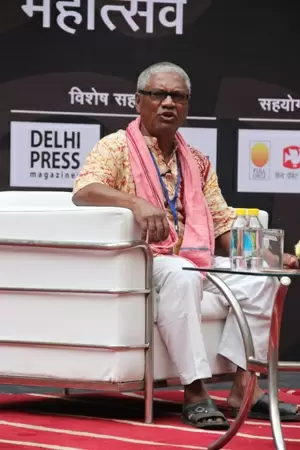A chance meeting with a celebrity author turns rickshaw puller into writer
08-November-2013
Vol 4 | Issue 45
He was a rickshaw puller and she was a celebrity author. There was no way Manoranjan Byapari would have met Mahasweta Devi. But destiny willed otherwise.
At a chance meeting, she asked him to write for her 'Bartika' journal. Thus began Bypari's stint as a writer that has seen him churn out over 100 short stories and leave an indelible mark in contemporary Bengali Dalit penmanship.
 |
|
Author Manoranjan Byapari at Samanvay festival of Indian languages (Photo: IANS)
|
The calm and composed 61-year-old now has no trace of the anger and bitterness that had once been his constant companions - the unfortunate reasons that put him behind bars for two years for getting into a fight.
The prison experience gave the Kolkata-based writer a fascinating story to relate to the audience at the recently concluded Samanvay festival of Indian languages in the capital.
He was 22-years-old when he started learning the Bengali alphabet in the prison. Poverty had left him bitter, angry and illiterate. But the thought of rotting behind the bars was "scary" enough to encourage him to take to learning. And once he initiated the process, he just got addicted.
"I didn't know how to read or write, but I was aware about what was happening in politics and the world. So I was illiterate but not unaware," said Bypari who now works as a cook and writes in his free time.
"I just got addicted to learning," he added.
And what shaped up his unusual career graph were opportunities: some he quickly grabbed and some he just chanced upon.
"There were two turning points in my life: first when I went to jail in 1974. I was a mere 22 years old and the thought of spending my entire life in prison was scary. An elderly man encouraged me to read. And once I did that with all conviction, I simply got addicted to it," recollected Byapari who grew up in a refugee camp in Bankura's Shiromanipur, and later took to rickshaw pulling for earning livelihood.
"The second was a chance meeting with Mahasweta Devi who gave me an opportunity to publish my first essay in her journal 'Bartika'," he recalled of her journey in his rickshaw, during which he asked her the meaning of a word. So impressed was she with his learning aptitude that she gave him an opportunity to write.
Hence began his journey of expressing his opinions through poems, essays and short stories. His novel "Itibritte Chandal Jiban" is considered the first autobiographical work by a Bengali Dalit writer.
The plight and sufferings of dalits have always been the pivotal theme of his narratives.
His first national acclaim came after a translation of his essay, "Is there Dalit Writing in Bangla?", was published in Economic and Political Weekly in 2007.
Despite all this transformation and newly-found love for writing, Byapari never gave up on his first job - rickshaw pulling - till he started working as a cook in a school a few years ago.
"Writing doesn't give you money. I needed money to sustain my living and rickshaw gave me that security. My writings are a mirror of the class and caste divide that we are still associated with," he rued.
"I also struggled to give up on the 'rouge criminal' tag post my stint in the jail. I was a reformed man, but I had the licence of 'prison'. People weren't taking me seriously, so I had no other option but to learn and grow despite all this resistance," he added.
Even though mainstream publications are finally taking a serious note of Dalit writings in the country and opening a window into their grim world with translated narratives, Byapari feels these don't reflect the real sufferings of the Dalits.
"I can't say whether it is Dalit literature. Those who have been writing must have felt angry or suffered an insult at some point of time that pushed them to writing," he said.
"There are many illiterate Dalits who don't have anyone to write their stories because they are poor and can't afford to. My writings come from the anger of my life and of the people around me," he concluded. - IANS
















